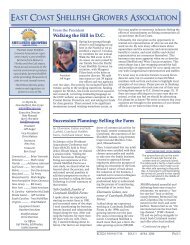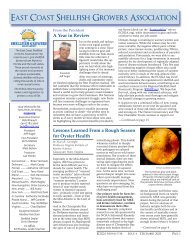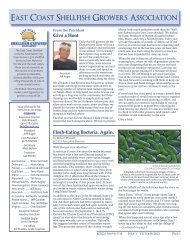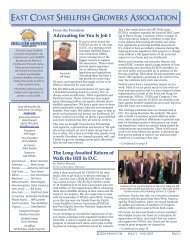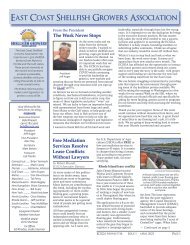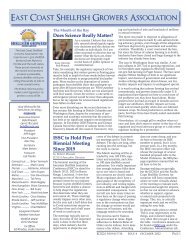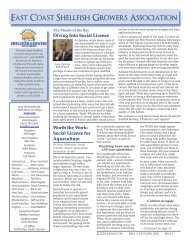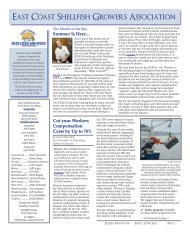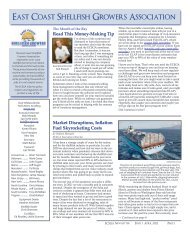East Coast Shellfish Growers Association August 2021 Newsletter
Read about the new disaster assistance for shellfish growers from the Farm Service Agency:ELAP; the death of Walt Canzonier; a win for South Carolina growers with help from allies; new biodegradable netting from Ketcham Supply; Prop 65 warnings; shellfish farm ecosystem services study.
Read about the new disaster assistance for shellfish growers from the Farm Service Agency:ELAP; the death of Walt Canzonier; a win for South Carolina growers with help from allies; new biodegradable netting from Ketcham Supply; Prop 65 warnings; shellfish farm ecosystem services study.
You also want an ePaper? Increase the reach of your titles
YUMPU automatically turns print PDFs into web optimized ePapers that Google loves.
Researchers Closing in on
Solution to Clam QPX
by Robert Rheault,
ECSGA Executive Director
A collaborative team 1 led by Bassem Allam
at Stony Brook University’s Marine Animal
Disease Lab and funded by NOAA has been
working on examining variations in the hardclam
genome in populations along the East
Coast. Their goal is to identify which genes
regulate various traits, in hopes of selecting
lines of clams with desired traits, such as rapid
growth, harder shells, and resistance to disease
and environmental stressors.
Since the 1990s clam growers on Cape Cod
have suffered devastating mortalities related to
a parasite historically known as QPX, Quahog
Parasite Unknown, but recently named as
Mucochytrium quahogii. Since the parasite is
ubiquitous along the East Coast, and mortalities
outside of Cape Cod are rare, pathologists
have long suspected that mortalities were probably
caused by stress or genetics.
In 2002 researchers were able to show a genetic
link to QPX resistance by planting clams from
different stocks into a location with high mortalities.
When some lines survived better than
others it became clear there was a genetic basis
for resistance. By using genetic sequencing
tools researchers have been working to identify
which genes are linked to survival, so that
hatcheries can select animals with those genes
to create lines of resistant clams.
Genetic sequencing allows researchers to
look for single nucleotide polymorphisms
(SNPs)—mutations in the genetic code where
the replacement of a single nucleotide leads
to changes in traits. The team planted clams
from two populations (one susceptible and
one largely resistant) in an area known for
QPX mortalities. By looking at the frequencies
of different SNPs in the populations before
and after a mortality event, they were able
to identify which genes might be associated
with resistance. They found that about 200
SNPs changed in frequency among the survivors,
pointing to potential resistance markers.
Researchers at the Virginia Institute of Marine
Science (Ann Ropp and collaborators) examined
the genetic diversity in 450 clams collected
from Canada to South Carolina, looking for
differences in the DNA. They discovered over
a 100,000 SNPs and identified six genetically
distinct populations.
The research effort at Stony Brook aims to describe
the genetic diversity of the species along
the East Coast and develop affordable genotyping
methods to identify genetic markers associated
with relevant traits for selective breeding.
Although their initial focus is to identify clam
stocks for QPX-disease resistance and heat
tolerance, future research could target other
traits. These studies have identified a large set
of markers that can be used as a solid basis for
using marker-assisted selection of hard clams
for economically important traits. Stay tuned!
1. storymaps.arcgis.com/stories/3425623358
164278bbe1ed7f7311a605
NEW
Plastic Corrugated Boxes!
MADE IN U.S.A.
■ Tough & Durable
Construction
■ 100% Recyclable
with Plastic # 5
■ Waterproof
■ Space Saving
vs. Foam
■ Weight Saving
vs. Waxed Boxes
P P C
PACKAGING PRODUCTS CORPORATION
FISH AND SHELLFISH PACKAGING SPECIALISTS
198 Herman Melville Boulevard, New Bedford, MA 02740 USA Ph 1-508-997-5150
Fax: 1-508-993-9807 • USA & Canada Toll Free 1-800-225-0484
Email: info@pkgprod.com • Website: www.pkgprod.com
Reach out today!
ECSGA Newsletter Issue 3 August 2021 Page 11




